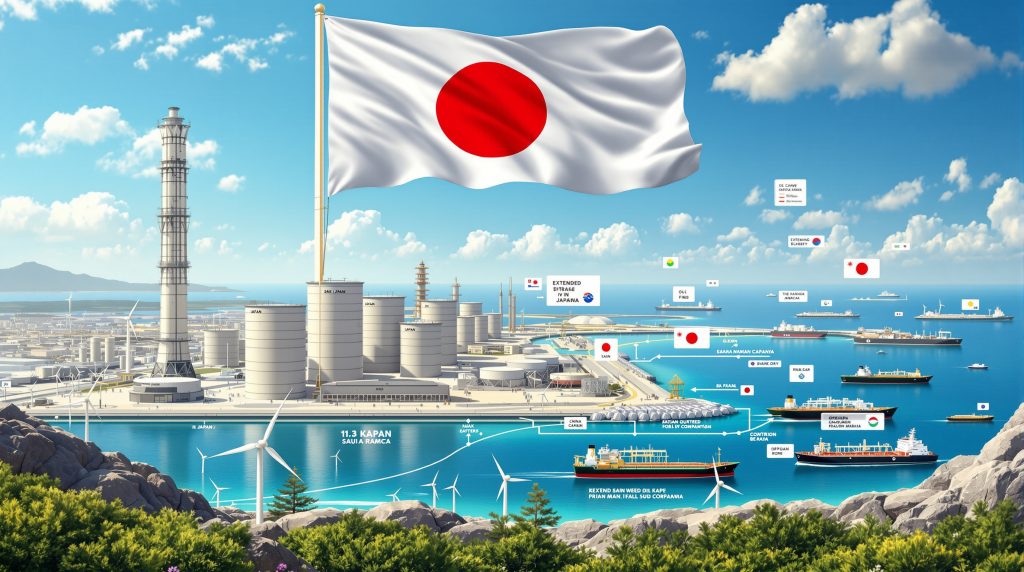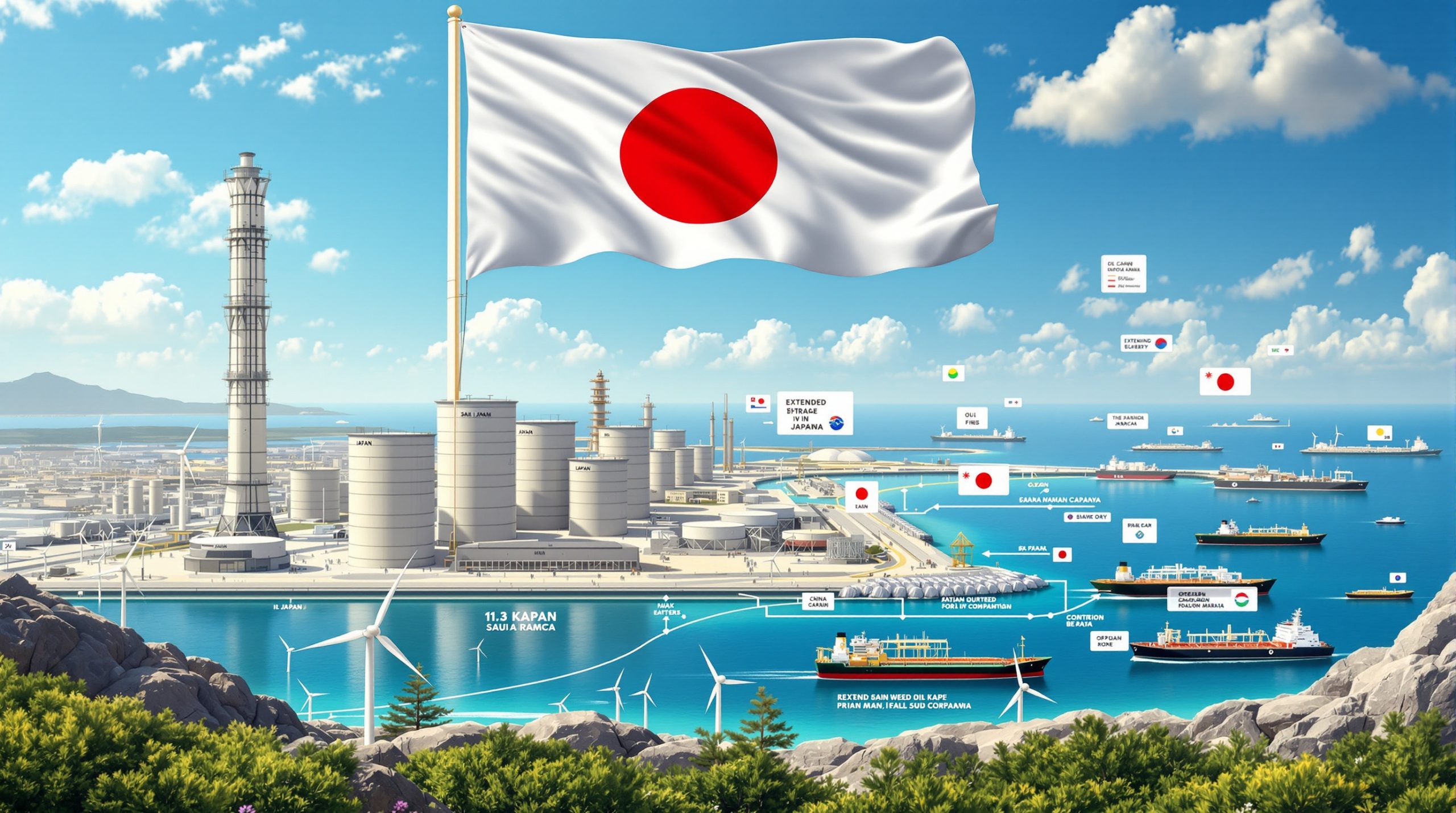Energy Security Through Bilateral Storage Arrangements
Japan extends crude storage deal with Saudi Arabia. Energy security frameworks across developing and developed nations increasingly rely on sophisticated bilateral storage arrangements that extend beyond traditional government-to-government petroleum reserve agreements. Furthermore, these partnerships blend commercial infrastructure with strategic emergency protocols. Insights from current crude oil prices underscore their growing importance.
Energy frameworks are evolving rapidly. In addition, market trends now require adaptation in risk management and supply chain flexibility. For instance, analysts note that increasing geopolitical uncertainties mean that traditional stockpiling models face mounting pressure. Meanwhile, emerging bilateral partnerships offer enhanced operational resilience.
Strategic Storage Framework Evolution in Asia-Pacific Markets
The bilateral arrangement between Japan and Saudi Arabia highlights a shift beyond conventional buyer-seller models. Through the Japan Oil, Gas and Metals National Corporation (JOGMEC), 1.3 million kiloliters of capacity spread across 13 specialised tanks in Okinawa create dual-purpose facilities. This mechanism eliminates the need for new government investment while providing guaranteed emergency supply access.
In parallel, commercial infrastructure is utilised expertly. For instance, JOGMEC leases storage capacity from established terminal operators, thereby transferring capital risk to private entities. In addition, such models maintain emergency supply guarantees through contractual protocols agreed with both parties.
Furthermore, industry experts have observed opec market influence on pricing and operational strategies. This influence further solidifies the need for innovative storage models amid shifting global markets.
Operational Mechanics of Multi-Party Storage Agreements
The storage arrangement operates on three distinct layers. Firstly, JOGMEC functions as an intermediary between private terminal operators. Secondly, companies like ENEOS Corporation and Cosmo Oil Company Limited provide the leased capacity. Lastly, fee-free access is granted to Saudi Aramco in return for prioritized supply commitments during emergencies.
Moreover, the collaborative model leverages existing capacities. Consequently, it avoids the heavy costs normally associated with new infrastructure. In addition, the structure has evolved to balance flexibility with supply assurance. Recent studies, including an oil price rally analysis, highlight these economic and operational benefits.
Emergency Access Protocol Implementation:
- Priority supply allocation during disruptions
- Preferential access independent of spot market conditions
- Integration with national strategic petroleum reserves
- Coordination with other bilateral storage arrangements
The agreement’s three-year renewal cycle has provided stability since 2010. This regular reprise allows both nations to adapt strategies with shifting regional market dynamics.
Comparative Analysis with Regional Storage Models
Japan’s strategy contrasts with other regional models. For instance, Singapore relies on market-driven commercial storage while China focuses on state-owned reserve expansion. Additionally, South Korea has embraced similar bilateral partnerships with Gulf producers. Consequently, each country tailors its approach to address specific economic and security concerns.
Regional Storage Strategy Comparison:
- Japan: Bilateral commercial lease; emergency access; government-mediated
- Singapore: Open commercial hub; market flexibility; private infrastructure
- China: State-owned reserves; national control; direct investment
- South Korea: Mixed bilateral; supply diversification; multiple producer agreements
Market insights from an oil price trade impacts report also suggest that these diversified models help mitigate regional price volatility.
Geographic Advantages Driving Okinawa's Strategic Position
Okinawa Prefecture is uniquely positioned at approximately 24-28°N latitude. Its proximity to Middle Eastern crude export routes reduces transit times and costs. In addition, the location offers strategic advantages by enabling quicker deployment of supplies to the broader Asian market.
The dual-operator structure is equally important. Managed by ENEOS and Cosmo Oil, the terminal benefits from modern automated systems and integrated refining networks. Furthermore, the facility can accommodate Very Large Crude Carriers (VLCC), enhancing its role as a transshipment hub. Analysts also point to assessments of us oil production decline as a factor necessitating such strategic placements.
Infrastructure Capabilities and Operational Advantages
The modern terminal features deep-water berthing and automated inventory management. Automated systems ensure precise quality control while facilitating rapid adjustments in crude allocation. In addition, the integrated downstream operations boost efficiency by linking storage with refining and distribution networks.
Saudi Aramco’s use of the storage facility further reflects its strategic role. The company benefits from rapid access to pre-positioned inventory, enabling better response during market fluctuations. Moreover, a recent storage update from Reuters notes that such efficiencies are pivotal in maintaining competitive market positioning.
Economic Implications and Cost-Benefit Analysis
This innovative arrangement allows Japan to secure strategic storage without incurring significant capital expenditure. By leasing commercial infrastructure, government agencies avoid the heavy costs of building dedicated facilities. Consequently, private terminal operators bear the capital risk, while Japan benefits from secured emergency supplies. Such efficiency has long-term economic advantages for both nations.
The fee structure exemplifies balanced risk-sharing. JOGMEC compensates terminal operators while granting fee-free access to Saudi Aramco. This dual model supports both commercial growth and strategic energy security objectives. Additionally, market observers refer to foreign energy news to highlight the increased focus on such innovative agreements in the current economic climate.
Mutual Economic Benefits:
- Japan: Avoided infrastructure expenditure, secure emergency supplies
- Saudi Arabia: Enhanced market positioning, flexible inventory management
- Terminal Operators: Steady revenue streams, optimised utilisation
- Regional Markets: Improved supply chain resilience, reduced price volatility
Integration with Japan's Broader Energy Security Framework
Japan’s crude oil import dependency—historically exceeding **90%**—necessitates a multi-layered risk management strategy. The bilateral storage arrangement integrates seamlessly with government-held strategic reserves. Furthermore, periodic adjustments ensure that these reserves remain responsive amid changing geopolitical conditions.
In the post-Fukushima era, the importance of petroleum reserves became starkly evident. The 2011 nuclear crisis underscored how essential these strategic stocks are when primary energy sources falter. In addition, the integration of bilateral agreements with other storage mechanisms provides additional safety layers.
Strategic Reserve Integration Components:
- Government-held petroleum reserves
- Mandated private commercial inventories
- Bilateral storage agreements with producing nations
- Coordinated emergency response protocols with the International Energy Agency
This comprehensive approach has inspired energy policies worldwide. Moreover, it underlines the need for continuous supply security as nations transition to renewable energy sources.
Alignment with Carbon Neutrality Objectives
While Japan pursues ambitious carbon neutrality targets, strategic petroleum reserves remain crucial. These reserves ensure supply stability during transitional periods. Additionally, they help prevent abrupt shifts in energy systems that might arise from supply disruptions. As both nations navigate their respective climate policies, the balance between sustainability and energy security is carefully maintained.
In the context of evolving energy strategies, Japan extends crude storage deal with Saudi Arabia remains a vital element of national policy. By securing traditional hydrocarbons while exploring renewable alternatives, Japan advances its climate and energy agendas concurrently.
Saudi Arabia's Asian Market Strategy Enhancement
The storage agreement reinforces Saudi Arabia’s strategic push into Asian markets. Pre-positioned inventory in Okinawa provides the company with vital flexibility during demand fluctuations. Furthermore, the arrangement supports a responsive hub-and-spoke distribution system that benefits multiple Asian nations.
Pre-arranged storage reduces reliance on floating storage, cutting both costs and lead times in supply deliveries. Additionally, it supports long-term customer relationships by ensuring timely supply even amid production issues. This strategic positioning is viewed as a countermeasure against competitive pressures from other major producers.
Hub-and-Spoke Distribution Optimisation
The integrated model facilitates speedy access to critical inventory. Consequently, Saudi Aramco can efficiently manage supply during market surges. Moreover, the hub-and-spoke system enhances distribution reliability and customer service. This operational excellence further solidifies the partnership's strategic role in the region.
Regional Supply Chain Benefits:
- Reduced delivery lead times
- Lower transportation costs
- Enhanced responsiveness to demand spikes
- Improved customer service through proximate inventory
Future Evolution of Japan-Saudi Energy Cooperation
As energy markets continue to evolve, the extension sets the stage for broader bilateral cooperation. In the near future, both nations may expand their agreements beyond crude storage to refined products and emerging fuels. Notably, Japan extends crude storage deal with Saudi Arabia stands as a model for evolving energy partnerships focused on hybrid commercial and strategic imperatives.
Both governments are increasingly investing in cutting-edge technologies. For instance, investments in hydrogen and ammonia infrastructure indicate a shift towards alternative energy sources. Furthermore, this collaborative spirit is likely to pave the way for multi-energy partnerships that address both current and future challenges.
Technology Collaboration Opportunities:
- Hydrogen production and storage systems
- Ammonia supply chain development
- Carbon capture and storage initiatives
- Advanced smart grid and energy efficiency technologies
As these initiatives progress, the foundation laid by the current crude storage agreement will facilitate even broader cooperation. In turn, this helps ensure long-term energy security while remaining adaptable to market and policy shifts.
Integration with Climate Policy Objectives
Future iterations of the arrangement will likely incorporate robust climate policy measures. In this evolving context, Japan extends crude storage deal with Saudi Arabia not only fulfills immediate energy security needs but also aligns with longer-term carbon reduction targets. This dual focus ensures that energy transition and climate goals proceed in tandem.
Strategic Implications for Energy Market Participants
The extended and well-structured energy partnership sends a strong message to global market players. Energy companies, investors, and policymakers now have a compelling model to emulate as they balance commercial interests with strategic security concerns. In addition, this development reinforces the importance of flexible and resilient supply networks amid market volatility.
Market Participant Implications:
- Energy Companies: Leverage bilateral agreements for supply stability
- Infrastructure Investors: Recognise sustained demand for strategic storage
- Financial Markets: Value security in investment portfolios
- Policy Makers: Model a balanced approach between commercial efficiency and strategic safeguards
Furthermore, thorough analysis suggests that this model is adaptable to broader international trends. As nations continue to navigate geopolitical pressures and evolving market demands, such innovative storage partnerships will likely become standard practice.
Finally, reflecting on integrated strategies, Japan extends crude storage deal with Saudi Arabia remains a cornerstone of robust energy policy. This measured approach offers long-term security and operational flexibility, enhancing overall market resilience.
In summary, the article demonstrates how bilateral storage agreements evolve into multifaceted frameworks that address both strategic risks and economic imperatives. Through careful planning, innovative infrastructure utilisation, and continuous adaptation to market and environmental challenges, the evolving partnership sets a precedent for effective energy security in a volatile global landscape.
Curious About Maximising Your Investment Returns Through Strategic Discovery Alerts?
Discover how to transform in-depth mineral data into actionable insights with Discovery Alert’s proprietary Discovery IQ model. Understand the potential for substantial returns by exploring our discoveries page, where historic success stories illustrate how timely alerts can provide a market-leading edge.




